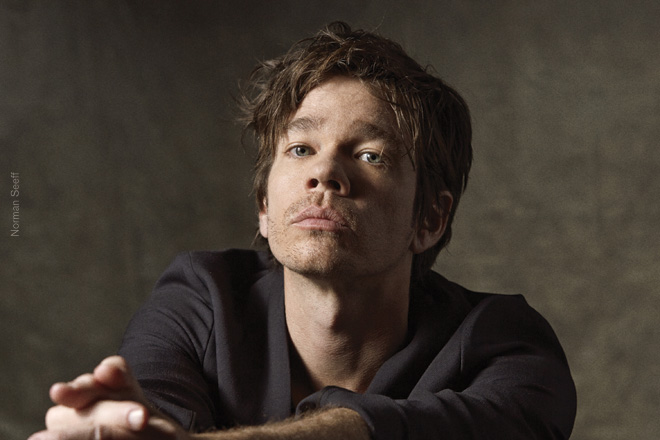NATE RUESS
His latest project proves that going solo is fun, too
After nearly three years of supporting Some Nights—the platinum-selling, 2012 breakthrough album by his Grammy-winning band fun.—Nate Ruess was feeling good. So good, in fact, he opted to temporarily step away from the trio and go solo. It was a bold move for the singer-songwriter, but it’s paying off. His album, Grand Romantic—a fittingly titled set of massive-sounding earworms partially inspired by his romance with designer Charlotte Ronson—features guest turns from Beck and Wilco’s Jeff Tweedy. It also boasts the same infectious melodies and pop-rock pomposity that made fun. tunes like “We Are Young” and “Carry On” such smashes.
How’s it feel to be a solo artist?
Sometimes it’s strange to not be in a band. But I’ve been having a blast. There are perks to not being in a band—like having complete creative control. You don’t have to worry about the other people’s schedules, or even having to have a conversation about the music. It’s not like it’s ever been a problem in the bands I’ve been in—I’ve been very lucky with people—but at the same time, there’s something nice about total freedom.
This record reflects your happiness.
When you think about being happy, you think about puppy dogs, roses and whatnot. My favorite happy song of all time is “Mint Car” by the Cure. When I make mix CDs or mixtapes or playlists for people, I always find myself looking for those songs that are sheer joy. I wanted to explore that on this album. I’d never done that before, and I’m proud of it. I don’t think I crossed that scary line of being too overjoyed. You never want to feel braggy about it, either. As a songwriter, I’m not out to be like, “Look at me. I’m so happy.”
Your music reflects a mix of genres.
As soon as the iPod existed, it changed the way we had access to everything. Growing up, I was an alternative kid, and then a punk-rock kid, then indie rock. It was one kind—or nothing. Having an iPod offered access to everything. You’re not stuck with your collection of metal CDs, or whatever it may be. And as a songwriter, anything can get me.
Beck also embraces different styles.
Beck is one of the pioneers of that whole “screw the genre” approach. He does a great job of shape-shifting throughout the albums, which is fantastic. It’s not something I’m equipped to do. His references are amazing. That’s what I look for in anyone I’m making music with—the references. You can’t create something unless you have the ability to look back and appreciate it.
How did Jeff develop his guitar solo?
I think he had read an article where I’d said my favorite Wilco song was “More Like the Moon.” It has a classical guitar solo at three different times in the song, and it’s always like a three-minute solo. He knew the era of Wilco that I was particularly looking for in the song—and he was able to channel that. That’s probably my favorite moment on the album.
A glockenspiel in “You Light My Fire”?
That was the culmination of a whole bunch of different glockenspiels and xylophones. I decided I wanted to do something slightly Dire Straits-y. I was just getting ready to go into the studio—seriously, I was getting dressed—and I wrote the entire track, riff, everything, in like two seconds. That’s always a great sign when something just comes, and you’re able to put it all together in two seconds.
–Kenneth Partridge




comment closed